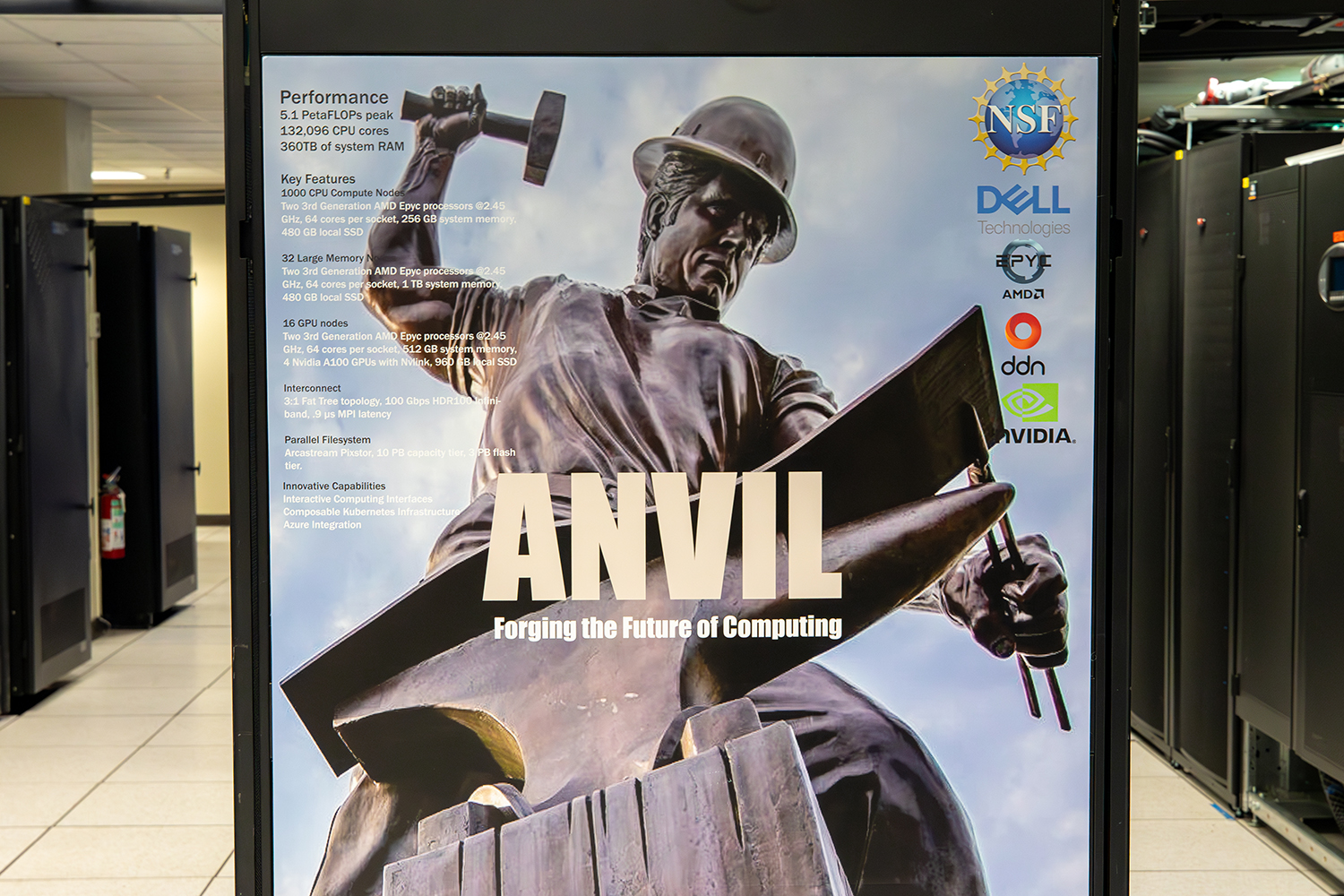Anvil supercomputer slated to assist with national pilot project aimed at advancing AI
Purdue University’s Anvil supercomputer is now an official resource provider for the newly launched National Artificial Intelligence Research Resource (NAIRR) Pilot.
The NAIRR is a National Science Foundation (NSF) project  aimed at creating a national infrastructure that connects U.S. researchers to responsible and trustworthy Artificial Intelligence (AI) resources. The NAIRR will also provide these researchers equitable access to the data, software, training, computational, and educational resources needed to advance research, discovery, and innovation within the field of AI.
aimed at creating a national infrastructure that connects U.S. researchers to responsible and trustworthy Artificial Intelligence (AI) resources. The NAIRR will also provide these researchers equitable access to the data, software, training, computational, and educational resources needed to advance research, discovery, and innovation within the field of AI.
The NAIRR Pilot, which Anvil is now a part of, is the first step towards realizing the full NAIRR vision. Its purpose is to demonstrate the NAIRR concept and advance its primary goals of spurring innovation, increasing diversity of talent, improving capacity, and advancing safe, secure, and trustworthy AI in research and society. The NAIRR Pilot will support research projects that focus on testing and validating AI systems, improving model performance, increasing the interpretability and privacy of learned models, reducing vulnerability to attacks, and assuring that AI functionality aligns with societal values and obeys safety guarantees. The NSF leads the project, but it is a collaborative effort involving 10 other federal agencies and 25 private sector, non-profit, philanthropy partners, as well as numerous academic providers like Purdue that will provide computing resources.
"The NAIRR pilot, fueled by the need to advance responsible AI research and broaden access to cutting-edge resources needed for AI research, symbolizes a firm stride towards democratizing access to vital AI tools across the talented communities in all corners of our country,” said NSF Director Sethuraman Panchanathan. “While this is only the first step in our NAIRR efforts, we plan to rapidly expand our partnerships and secure the level of investments needed to realize the NAIRR vision and unlock the full potential of AI for the benefit of humanity and society.”
The Anvil supercomputer will play a major role as a provider of allocatable computational resources for the NAIRR Pilot. Anvil will contribute the following resources to the current allocations call:
- Access to the 1000-node Anvil CPU cluster and the existing 64-GPU Anvil GPU resource
- Access to the Anvil Composable subsystem (Kubernetes-based private cloud consisting of CPUs & GPUs with access to large data storage); suitable for applications such as:
-
* Model inference * Specialized LLMs * Dataset Hosting * Science gateways and web applications hosting * Classroom and training (e.g., via interactive access interfaces) - Access to the Anvil user support team, which has diverse experience in AI as well as application domains such as materials science, astrophysics, bioinformatics, and more.
- Dedicated training on various topics, including data science, computing, and generative AI, to help users effectively utilize the resources on Anvil.
To augment these existing offerings, Anvil was recently awarded supplemental funding from the NSF to join the NAIRR effort. This supplement will enable the Anvil team to further expand Anvil’s GPU compute capabilities, support high-performance object storage, and provide the operational support needed for users of the NAIRR.
“We are very excited to take part in such an important effort and help provide the nation with advanced AI computing resources,” says Rosen Center Chief Scientist Carol Song, principal investigator and project director for Anvil. “Anvil was intended to lower barriers to applications of high-performance computing, with AI being a key workload. Joining the NAIRR, the Anvil team will bring together Purdue’s long history of supporting advanced computing with the experts being assembled on our campus to work on strategic initiatives, including Purdue Computes and the new Institute for Physical AI.”
The Purdue Computes initiative is a multidimensional effort to advance computing both at Purdue and nationwide. Purdue Computes focuses on three pillars: 1) Advancing Purdue’s Department of Computer Science to a top 10 national ranking; 2) Investing in the research and manufacturing of semiconductors—a key component required for all computing; and 3) Launching and furthering the development of the university-wide research Institute of Physical AI (IPAI). The intent of IPAI is to build a world-leading program in artificial intelligence, bringing together researchers across domains to solve the world’s toughest challenges. By leveraging the resources provided by the Purdue Computes initiative, specifically the experts working with IPAI, the Anvil team is poised to provide world-class support and expertise to the NAIRR project.
The NSF has announced the first 35 projects that will be supported through the NAIRR Pilot: https://new.nsf.gov/news/nsf-led-national-ai-research-resource-pilot-awards. The second round of allocation applications is now open. Researchers and educators can apply for access to these resources and view descriptions of the first cohort projects at https://nairrpilot.org/
Anvil is Purdue University’s most powerful supercomputer, providing researchers from diverse backgrounds with advanced computing capabilities. Built through funding from the National Science Foundation (NSF), Anvil supports scientific discovery by providing resources through the NSF’s Advanced Cyberinfrastructure Coordination Ecosystem: Services & Support (ACCESS), a program that serves tens of thousands of researchers across the United States.
More information about Anvil is available on Purdue’s Anvil website. Anyone with questions should contact anvil@purdue.edu. Anvil is funded under NSF award No. 2005632.
Written by: Jonathan Poole, poole43@purdue.edu
